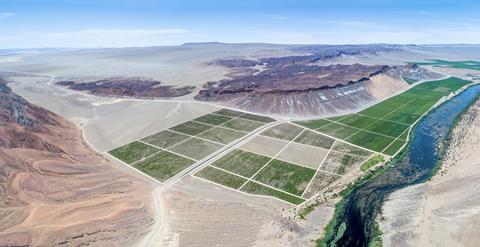High-level discussions come hard on the heels of South Africa hosting the African Free Trade and Investment conference in Cape Town
The South African and Namibian fruit export sectors have for many years argued that the development of port infrastructure in Namibia and regular shipping opportunities from those ports would go a long way to resolving export logistics challenges in Southern Africa.
This week they were given fresh hope with the official state visit of Namibian President, Hage G Geingob, and his trade delegation, to South Africa. This follows the African Free Trade Summit in Cape Town this week, which is another step forward in finalising arrangements for what is called the world’s largest economic and trade zone, serving some 1.3bn people.
As part of the state visit South African agriculture minister Thoko Didiza met with her Namibian counterpart Carl-Hermann Gustav “Calle” Schlettwein, who also previously served as finance minister to discuss the opportunity to strengthen trade ties between the two countries.
Relations between the governing South African party and that of Namibia go back to the so-called independence war in Namibia in the 1970s and 1980s. Since then, South Africa has become Namibia’s most important trading partner. As for exports, Namibia’s meat and fish products are sought after internationally, and since 2000 it has developed a growing and thriving table grape export business.
These industries require good export infrastructure – which includes good export facilities for fresh produce, deep-frozen products and a decent road system to the main port of Walvis Bay.
At present all Namibian table grapes are exported through Cape Town which often causes delays in shipping activities during the peak of the season. For South Africans it is equally important to have shipping opportunities on the West Coast of Southern Africa.
It could also become an alternative for the table grape growers in the Orange River region of South Africa, who suffer similar logistics problems in the port of Cape Town. Other South Africa export industries may also find a good operating port and regular shipments attractive.
On the East Coast of Southern Africa, new investments in the port of Maputo have created better opportunities for citrus growers in the region. However, observers say ultimately the prospects of better shipping facilities via Walvis Bay will only be achieved if the world’s shipping companies include the port in their shipping schedules.
They therefore note with interest MSC’s recent announcement that it aims to be a key driver in a “fruitful partnership” between the continents of Africa and Europe. Latest figures indicate that Europe imported around 2.7m tonnes of fresh fruit from Africa in 2020, with a total value of €2.5bn.
“With good shipping and exporting, countries like Zimbabwe, Kenya, Tanzania, Senegal and Côte d’Ivoire can easily sell their fruits to Europe and make more money for their farmers and their families,” the company said.
Source : FruitNet










